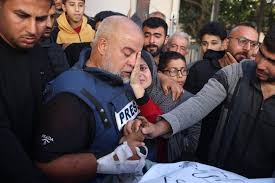In a significant development highlighting the growing tensions between media organizations and military operations, Al Jazeera has forcefully rejected unfounded claims made by the Israeli military regarding six of its journalists in Gaza. The accusations, which attempt to link these journalists to militant organizations, have raised serious concerns about press freedom and the safety of media personnel in conflict zones.
Contested Allegations and Network Response
The Israeli military’s statement, posted on social media platform X, specifically named six Al Jazeera Arabic correspondents: Anas al-Sharif, Talal Aruki, Alaa Salama, Hosam Shabat, Ismail Farid, and Ashraf Saraj. The military presented what it called “documents” allegedly proving these journalists’ connections to Hamas, including supposed training course records and salary lists. However, Al Jazeera categorically rejected these allegations, characterizing them as a calculated attempt to silence crucial reporting from the region. The network emphasized that these accusations coincide with their recent investigative reporting on potential war crimes in Gaza.
Pattern of Media Targeting and Casualties
The current situation reflects a broader context of journalist casualties and media restrictions in the region. Since October 2023, Al Jazeera has lost three journalists to Israeli attacks, including Ismail al-Ghoul, Rami al-Rifi, and Samer Abudaqa. The death of Shireen Abu Akleh in May 2022 remains a significant point of contention, with Israel acknowledging their involvement but declining to pursue criminal investigations. The Committee to Protect Journalists has documented at least 128 media-related casualties in Gaza since the conflict’s beginning, designating this as the deadliest conflict for journalists in modern history.
The timing of these unfounded claims gains additional significance considering Israel’s recent actions against media organizations, including the raid on Al Jazeera’s Ramallah office and Netanyahu cabinet’s decision to shut down the network’s operations within Israel. The network continues to be one of the few international media outlets maintaining coverage in northern Gaza, where approximately 400,000 people remain trapped amid ongoing military operations and humanitarian challenges.
As tensions continue to escalate, these unfounded claims against Al Jazeera’s journalists underscore the precarious position of media workers in conflict zones. The international community’s response to these allegations and their potential impact on press freedom will likely shape the future of war journalism and media coverage in contested regions.
The article highlights how accusations against journalists can be used as potential tools to control narrative flow from conflict zones, raising crucial questions about the protection of press freedom and the vital role of independent media in documenting humanitarian situations. As the only major international network maintaining a presence in northern Gaza, Al Jazeera’s ability to continue its coverage amid these challenges remains crucial for global understanding of the ongoing conflict.
Related News
















